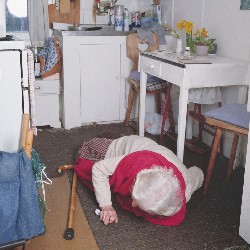Cataract surgery reduces elderly patients risk of falling by one-third, and improves visual function and general health status, according to a study published in the January 2005 issue of the British Journal of Ophthalmology.
Some 306 women older than age 70 were randomized to expedited (i.e., approximately four weeks) or routine (i.e., 12 months wait) cataract surgery. Patients reported their falls in a diary, and were followed-up with every three months. Health status was measured after six months.
Visual function improved in the expedited surgery group, as 8% of patients experienced acuity worse than 6/12 (20/40) compared to 37% of patients in the routine surgery group (i.e., those who had not yet undergone surgery, or the control group).
Throughout 12 months of follow-up, 49% of patients in the expedited surgery group fell at least once, and 18% fell more than once. However, 45% of patients in the routine surgery group fell at least once, and 25% fell more than once.
Falling was reduced by 34% in patients who underwent surgery.
In addition, activity, anxiety, depression, confidence, visual disability and handicap improved in patients who underwent cataract surgery compared to those who did not.
 |
| One in three adults ages 65 and older suffers from falls each year. A recent study finds that after cataract surgery, falls among elderly patients dropped by one-third. |
Over the six months of follow-up before we repeated our measurements, all aspects of visual function and health status deteriorated in the unoperated control group, says the lead author of the study, Rowan Harwood, M.D., of the Department of Health Care of the Elderly at University Hospital in Nottingham, England.
Dr. Harwood believes this is the first study to show that improving vision reduces the risk of falls.
Of course the main reason for improving vision is that people want to see better, but our findings point to the importance of assessing vision (and looking for cataracts) in people who fall, or who are at risk of falling, Dr. Harwood says.

